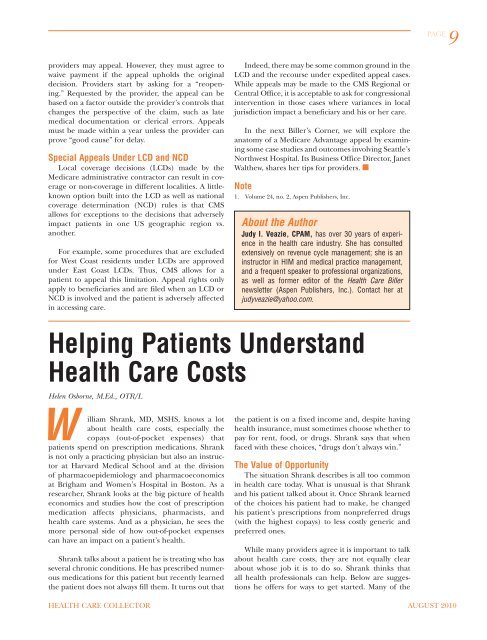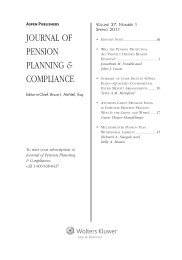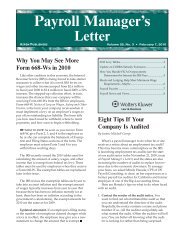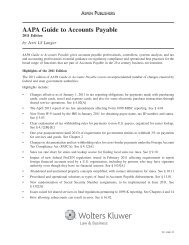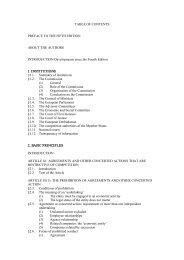Health Care Collector - Kluwer Law International
Health Care Collector - Kluwer Law International
Health Care Collector - Kluwer Law International
You also want an ePaper? Increase the reach of your titles
YUMPU automatically turns print PDFs into web optimized ePapers that Google loves.
PAGE9<br />
providers may appeal. However, they must agree to<br />
waive payment if the appeal upholds the original<br />
decision. Providers start by asking for a “reopening.”<br />
Requested by the provider, the appeal can be<br />
based on a factor outside the provider’s controls that<br />
changes the perspective of the claim, such as late<br />
medical documentation or clerical errors. Appeals<br />
must be made within a year unless the provider can<br />
prove “good cause” for delay.<br />
Special Appeals Under LCD and NCD<br />
Local coverage decisions (LCDs) made by the<br />
Medicare administrative contractor can result in coverage<br />
or non-coverage in different localities. A littleknown<br />
option built into the LCD as well as national<br />
coverage determination (NCD) rules is that CMS<br />
allows for exceptions to the decisions that adversely<br />
impact patients in one US geographic region vs.<br />
another.<br />
For example, some procedures that are excluded<br />
for West Coast residents under LCDs are approved<br />
under East Coast LCDs. Thus, CMS allows for a<br />
patient to appeal this limitation. Appeal rights only<br />
apply to beneficiaries and are filed when an LCD or<br />
NCD is involved and the patient is adversely affected<br />
in accessing care.<br />
Indeed, there may be some common ground in the<br />
LCD and the recourse under expedited appeal cases.<br />
While appeals may be made to the CMS Regional or<br />
Central Office, it is acceptable to ask for congressional<br />
intervention in those cases where variances in local<br />
jurisdiction impact a beneficiary and his or her care.<br />
In the next Biller’s Corner, we will explore the<br />
anatomy of a Medicare Advantage appeal by examining<br />
some case studies and outcomes involving Seattle’s<br />
Northwest Hospital. Its Business Office Director, Janet<br />
Walthew, shares her tips for providers. ■<br />
Note<br />
1. Volume 24, no. 2, Aspen Publishers, Inc.<br />
About the Author<br />
Judy I. Veazie, CPAM, has over 30 years of experience<br />
in the health care industry. She has consulted<br />
extensively on revenue cycle management; she is an<br />
instructor in HIM and medical practice management,<br />
and a frequent speaker to professional organizations,<br />
as well as former editor of the <strong>Health</strong> <strong>Care</strong> Biller<br />
newsletter (Aspen Publishers, Inc.). Contact her at<br />
judyveazie@yahoo.com.<br />
Helping Patients Understand<br />
<strong>Health</strong> <strong>Care</strong> Costs<br />
Helen Osborne, M.Ed., OTR/L<br />
W<br />
illiam Shrank, MD, MSHS, knows a lot<br />
about health care costs, especially the<br />
copays (out-of-pocket expenses) that<br />
patients spend on prescription medications. Shrank<br />
is not only a practicing physician but also an instructor<br />
at Harvard Medical School and at the division<br />
of pharmacoepidemiology and pharmacoeconomics<br />
at Brigham and Women’s Hospital in Boston. As a<br />
researcher, Shrank looks at the big picture of health<br />
economics and studies how the cost of prescription<br />
medication affects physicians, pharmacists, and<br />
health care systems. And as a physician, he sees the<br />
more personal side of how out-of-pocket expenses<br />
can have an impact on a patient’s health.<br />
Shrank talks about a patient he is treating who has<br />
several chronic conditions. He has prescribed numerous<br />
medications for this patient but recently learned<br />
the patient does not always fill them. It turns out that<br />
the patient is on a fixed income and, despite having<br />
health insurance, must sometimes choose whether to<br />
pay for rent, food, or drugs. Shrank says that when<br />
faced with these choices, “drugs don’t always win.”<br />
The Value of Opportunity<br />
The situation Shrank describes is all too common<br />
in health care today. What is unusual is that Shrank<br />
and his patient talked about it. Once Shrank learned<br />
of the choices his patient had to make, he changed<br />
his patient’s prescriptions from nonpreferred drugs<br />
(with the highest copays) to less costly generic and<br />
preferred ones.<br />
While many providers agree it is important to talk<br />
about health care costs, they are not equally clear<br />
about whose job it is to do so. Shrank thinks that<br />
all health professionals can help. Below are suggestions<br />
he offers for ways to get started. Many of the<br />
HEALTH CARE COLLECTOR AUGUST 2010


